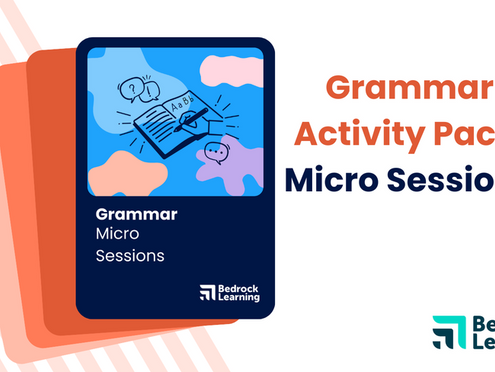In this article, we look at how grammar rules impact the journey to becoming a good writer.
Writing is one of the most valuable tools we have in life, impacting everything from learning to self-expression and communication with other people. Good writing skills open up academic, employment and social opportunities.
Good grammar contributes to good verbal and written communication, with evidence linking grammar instruction with effective writing. Educators play a significant role in creating an environment where learners develop their writing voice, and supporting them in their writing journey by integrating grammar instruction with writing processes. This adds meaningful context to grammar rules, while improving accuracy, clarity and quality of writing.
Starting the writing journey in primary school
The journey to becoming an effective writer starts in primary school. From early in their academic lives, primary education gives learners exposure to rich reading opportunities, with reading aloud being a way of sharing vocabulary, demonstrating how the written word works and identifying rhythms, patterns and grammar structures.
In lessons, learners should experience the writing process and learn how to craft many different types of written communication such as poems, lyrics, letters, diaries and so on, with plenty of time for grammar and writing skills to be scaffolded and reinforced through teacher modelling.
However, while this would be the perfect learning scenario for many young learners, these methods of teaching are not present in every primary classroom - it’s not difficult to see why not.
Teachers are becoming more and more stretched with the time they have, and when working to a content-driven curriculum, some of the essential soft skills of effective writing are often the first to lose consistency. As well as this, many learners (and teachers!) do not find grammar to be the most engaging topic, so finding an enjoyable way to immerse primary learners in explicit grammar instruction can be challenging for a time-poor teacher working alone.
Running parallel to this, and entwined within it, is explicit instruction of the grammar they’re seeing and hearing across a variety of texts. In the planning, drafting and writing stages, new grammar structures are introduced and used in context of both narrative and non-narrative writing. In editing and revising, there are opportunities for discussing how grammar works in practice and the impact it has on the reader.
Most teachers believe that grammar is crucial for developing primary learners’ writing skills - in fact, a recent study facilitated by Bedrock found that the exact figure was 96% of all teachers - but less than 50% of teachers found it easy to teach grammar without the assistance of a digital curriculum tool. To make the most of the benefits grammar instruction can have on learners' writing composition from Reception to higher education teachers and learners need a consistent, engaging solution to teaching grammar.
Moving on to specialist writing at secondary level
Once learners move on to secondary school, they are expected to demonstrate their writing skills through tasks within the English curriculum where they are assessed on skills such as sentence structure, punctuation, text organisation, composition and effect. They also start to use their writing skills across the curriculum within subject-specific contexts.
In secondary schooling, the focus moves beyond just producing text to crafting structured text - with an introduction, paragraphs clearly setting out relevant points, evidence to back up statements and a conclusion – and using grammar and vocabulary skills to do it well. Teachers model structures and subject-specific language and grammar for students to learn and apply.
At Key Stage 4 and 5, students start to experience writing within a professional environment as they look at careers and plan their next steps. They write applications and personal statements for sixth form, college or university, or write CVs and cover letters for apprenticeship and job applications. Strong writing skills help them convey their personality and skills.
While developing the writing skills they need for secondary schooling is a challenge in and of itself, this is made even more difficult if learning from the earlier key stages is not reinforced. Even in KS4, a learner without a solid understanding of foundational grammar skills is likely to struggle with more complex topics.
In a class of 20-30 learners with different needs and pain points, it isn’t possible for one teacher to reinforce the grammar techniques from every key stage to ensure all learners understand them. To ensure these foundational skills are reinforced, digital literacy tools such as Bedrock’s grammar curriculum can help.
Experiencing academic writing in higher education
When they make the leap to higher education, learners may find that writing becomes even more subject specific and they need to develop strong academic writing habits to support their progress through their courses. Clear and logical written arguments with accurate grammar, spelling and punctuation are expected at this level. Students also need to learn to cite sources in their writing, referencing, and avoiding plagiarism.
Again, highly complex writing skills like these are not possible without a foundation of strong grammar understanding. There are many adults in the UK who, despite being fluent in spoken English, do not have a strong knowledge of grammar techniques - reinforcing these key skills can benefit learners of all ages.

Improve grammar through engaging video instruction
Human narration, video teaching, recap activities and mastery tasks.
Writing for work and life
Outside of the education system, writing continues to play an important role in learners' lives. In many jobs, writing is a necessary skill, essential for communicating and collaborating and often a means by which employees’ ideas and contributions are judged. From the application letter and CV, through to writing emails, memos, reports and proposals, writing skills and good grammar are valuable assets in the workplace.
For some, writing is work. There is a huge range of varied writing roles, from creative writing to journalism, public relations and marketing, where the writing processes and grammar skills learned in school are highly relevant. Writing skills reach into all areas of life, whether it’s the practicalities of filling in a form, journal writing for wellbeing, or creative writing for pleasure.
The grammar foundations of good writing
Solid grammar basics support learners throughout their writing journey by laying down the rules for how words can be put together to form sentences that others can understand.
It is the foundation of good grammar, learned in the early years of education, that really makes a difference later in life. Here are three of the most important grammar building blocks learners need to master.
- Sentence structure: Starting with the basic sentence structure, learners discover how combining a subject with a verb allows them to express an idea, belief or feeling clearly, such as I am hungry. They go on to experiment with different sentence lengths and structures and include other elements to add detail and bring their writing to life. I am so hungry I could eat a horse!
- Punctuation: This grammar element creates meaning and flow. It tells the reader when to start and when to stop, lets them know when someone is speaking or a question is being asked, and adds pauses and expressions. Take the statement, The shop is shut. Change the punctuation and you transform a fact into a question: The shop is shut? From full stops to question marks, colons and hyphens, punctuation is a powerful tool for writers.
- Word order: The order of words in a sentence creates meaning, and changing the order can change the meaning, which is why this is such an important grammar element to learn early on in the writing journey. For example, The farmer chased the cow is very different to The cow chased the farmer.
Starting good grammar habits early
Teachers can help learners to build good grammar habits early in their writing journey by integrating grammar instruction into the writing process. Editing and revising learners’ writing can provide opportunities to embed these skills by modelling to young writers how to look out for errors and identify ways of improving their writing.
Here are five habits teachers can use to help learners improve their writing.
- Use active verbs: Instead of using a verb with an adverb, consider if a more powerful active verb could improve a sentence. For example, The mouse ran quickly across the room, can be brought alive with an active verb: The mouse darted across the room.
- Omit needless words: Removing unnecessary words results in clearer and cleaner writing. Learners should get into the habit of asking themselves if they need that adjective or if they’ve included overly long phrases. Words that don’t add to the writing in some way can come out.
- Edit for errors: It’s great to get into the habit of editing for errors as early as possible. Sharing a piece of writing that does not contain any errors is always more impactful, whether it’s in an exam or in an email at work.
- Get punctuation right: When editing, check the punctuation is in place, and also that it hasn’t been overused. For example, an exclamation mark at the end of a sentence turns a statement into an exclamation and should only be used when necessary.
- Use capitalisation correctly: Capitalise at the start of a sentence; for titles of books, films, plays and so on; for proper nouns, such as people and places; for expressions of time, such as days of the week and national holidays; and always for the pronoun ‘I’.
How Bedrock’s core curriculum supports writing through grammar
Reading, writing and vocabulary all play a role in supporting one another - this was a connection focused on in Ellie Ashton’s teaching and learning webinar series on disciplinary literacy. That is why Bedrock’s core curriculum teaches Tier 2 vocabulary and new grammar techniques side by side; improvement in one area supports the other, benefiting learners’ overall literacy skills and, thus, their writing.
As well as this, Bedrock’s vocabulary curriculum features free-writing tasks that encourage learners to put new vocabulary into complete responses. Combined with explicit grammar instruction, these responses work as a great way to assess how vocabulary and grammar come together to support effective writing.
This is built upon further in Bedrock Mapper’s written responses section, where learners are asked to craft subject-specific responses to Tier 3 vocabulary prompts. Again, when used in conjunction with Bedrock’s core curriculum, this provides a great opportunity to assess learners’ understanding of grammar for writing, especially as learners began to craft more and more complex written responses in later key stages.




